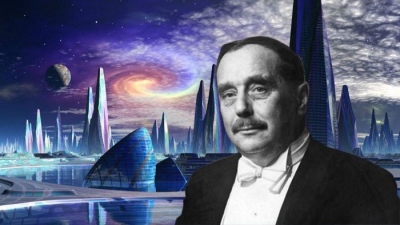
English writer H.G Well is considered one of the great fathers of science fiction, for developing and popularising the genre. Let us look at his novella The Invisible Man and see what makes it relevant today.
About the author
Herbert George Wells one of the fathers of modern science fiction (sci-fi) was born on September 21, 1866, in Bromley. England. He was the youngest of four children of Joseph (Joe) Wells, a gardener and cricketer-turned-shopkeeper, and his wife Sarah.
Wells had been a voracious reader from a very early age. When a broken leg immobilised him at the age of seven, the adventures his paperbound friends offered became his favourite pastime. By the time he was 13. he had already finished his first literary work The Desert Daisy, all the while excelling in school But growing up in a financially impoverished household he had to stop his formal education at the age of 14 and was employed (with his two elder brothers) to become an assistant to a draper and contribute to his family’s income. When he was fired by his first employer, he became an assistant to a chemist. This was followed by an apprenticeship under another draper, till he won a scholarship to study biology at the Normal School of Science in London at the age of 18. There he met T.H. Huxley, a vocal supporter of Darwinism and a person who will instil a love for zoology and set him up for the next stage of his life.
In school, he dedicated most of his time to literature and politics. It was during this phase of his life that he started writing in the genre we identify as science fiction and wrote The Chronic Argonauts, a story that would later turn into one of his most celebrated books, The Time Machine (1895).
The scientific romance
The Time Machine was the first example of what Wells called scientific romance. This was a blend of serious social and scientific commentary intricately woven with a fast pace entertaining page-turner. These scientific romances laid the foundation for the modem sci-fi genre.
What makes it a classic?
The individual and the society
The end of the novella reveals that Griffin is an albino, who was shunned by his fellows in university because he looked different. It is this rejection and society’s inability to look past his physical difference to the intelligent man within, that has instigated his turn to the bad side.
Griffin’s story can also be seen as a parable that educates the readers to debate the role society plays in creating the evils that plague it.
Invisibility
Jamaican-born Canadian speculative fiction writer Nalo Hopkinson defines sci-fi as “that branch of literature that deals with the consequence of humanity’s use of tools for manipulating nature”. In Griffin’s case, this need to manipulate oneself physically stems from the bitterness and cruelty he faced growing up and stands as a metaphor for how insubstantial and worthless people have made him feel of his appearance.
The story’s resolution with the death of the invisible man can also be seen as moral symbolising the detriments of using science and technology for selfish means instead of the betterment of the world.
The art of education
The hallmark of Well’s 50-year writing career is the lesson his stories entail. He would always say that he recognised himself as a teacher and a journalist before an artist. According to him, the function of art was to educate and enrich the lives of the people it comes in contact with.
Professor Simon James from the Department of English Studies at Durham University says that “Education is Well’s panacea (universal cure) for the social divisions that he sees in the world he inhabits. It’s about seeing the world in an informed way that allows you to address it and fix it and try to make it better.” Well’s use of sci-fi to address anxieties of the world regarding the extraordinary development of technology, to reflect on the nature and essence of humanity, and explore how we understand each other, is what makes him stand out from his peers as the indispensable proponent of the genre.
Picture Credit : Google



